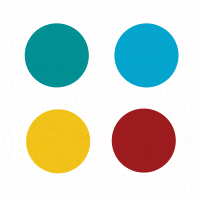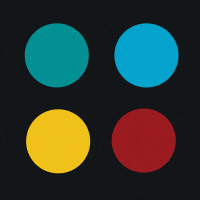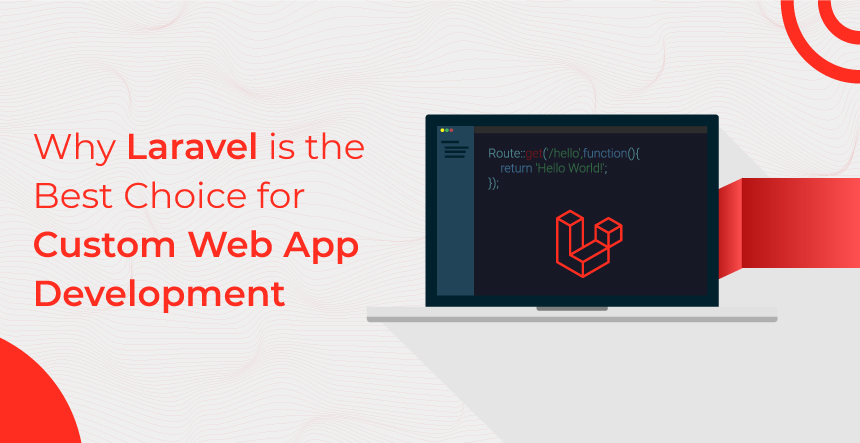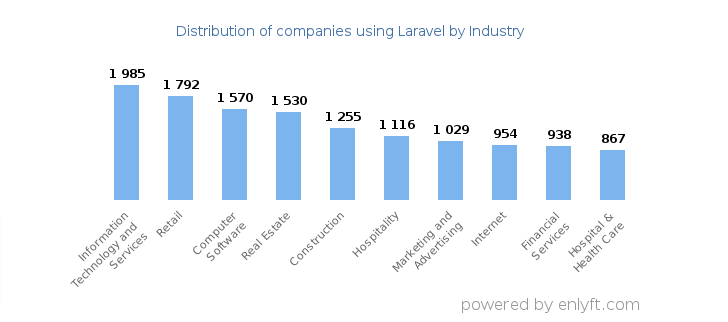




The web development landscape is constantly evolving, with new frameworks and technologies emerging all the time. However, one framework that has stood the test of time is LARAVEL.
Laravel is a PHP framework that is known for its elegant syntax, comprehensive feature set, and thriving community. These factors have made Laravel a top choice for web developers who intend to build robust and efficient web applications. The techies recommend Laravel development to build cost-effective and scalable business apps for entrepreneurs.
In this article, we will explore the reasons why Laravel remains the preferred framework for web application development. We will discuss the features that make Laravel web app development so popular for entrepreneurial business solutions.
Laravel is an open-source PHP framework created by Taylor Otwell in 2011, known for its simplicity, versatility, and developer-friendly approach. Laravel development follows the Model-View-Controller (MVC) architectural pattern and leverages the power of PHP to provide a rich set of tools and functionalities for building modern web applications. Laravel development is applicable for a wide range of projects, from small business websites to large-scale enterprise applications, offering out-of-the-box support for essential web development aspects like routing, caching, security, and database management. With seamless integration with third-party libraries and services.
Laravel’s syntax is clean, expressive, and easy to understand, enabling developers to write code that is both efficient and readable. Its intuitive structure and well-documented APIs make it beginner-friendly, allowing developers to get up to speed quickly. Laravel’s focus on developer productivity is evident in features like the artisan command-line interface, which automates repetitive tasks, and the Laravel Forge server management tool, which simplifies server configuration and deployment.
Laravel follows the MVC architectural pattern, which promotes a clear separation of concerns and enhances code organization. This separation allows developers to work on different components of the application independently, making maintenance and future enhancements easier. By adhering to the MVC pattern, Laravel fosters code reusability and promotes the development of scalable applications.
Laravel offers the Blade templating engine as a standout feature. Blade is a lightweight yet powerful templating engine that simplifies the creation of dynamic web pages. With its intuitive syntax and efficient performance, Blade is an excellent choice for developing high-performance web applications.
Laravel includes a built-in authentication system that enables developers to implement user authentication and authorization swiftly. By providing pre-built authentication controllers, middleware, and views, Laravel streamlines the process of integrating user authentication into applications, allowing developers to focus on other core functionalities.
Laravel’s Eloquent ORM (Object-Relational Mapping) is a key component that enhances the framework’s capabilities. It offers a user-friendly and expressive API for database interactions, simplifying tasks such as querying, inserting, updating, and deleting data. With Eloquent, developers can seamlessly work with databases and benefit from efficient data management.
Laravel’s Artisan command-line interface empowers developers with a versatile toolset accessible from the command line. Artisan provides a wide range of built-in commands that expedite tasks like generating boilerplate code, managing database migrations, running tests, and more. This command-line interface enhances developer productivity and offers convenient automation options.
One of the key reasons Laravel has retained its popularity is its thriving ecosystem. Laravel provides a vast collection of packages, libraries, and extensions known as the “Laravel Ecosystem.” These resources offer ready-to-use solutions for common tasks such as authentication, caching, form validation, and more. The Laravel community actively contributes to this ecosystem, continuously enriching it with new packages and features, which saves developers time and effort.
Laravel’s database management capabilities simplify the process of working with databases. Its object-relational mapping (ORM) tool, Eloquent, provides an intuitive and expressive syntax for interacting with databases, eliminating the need for writing complex SQL queries. Eloquent supports various database systems, including MySQL, PostgreSQL, and SQLite, making it flexible for different project requirements.
Security is paramount in web application development, and Laravel addresses this concern effectively in Laravel development. It incorporates features like hashed password storage, cross-site scripting (XSS) protection, and SQL injection prevention to ensure the security of web applications. Laravel’s built-in authentication and authorization mechanisms further simplify the implementation of user authentication and access control.
Laravel offers robust testing and debugging tools that streamline the development process. The framework provides a testing suite with built-in support for unit testing, integration testing, and acceptance testing. Additionally, Laravel’s comprehensive error handling and logging system helps developers identify and resolve issues quickly, enhancing the overall quality and stability of web applications.
The Laravel team consistently works on enhancing the framework by introducing new features, resolving bugs, and improving performance. This commitment to continuous improvement ensures that Laravel remains relevant and up-to-date, solidifying its position as a dominant force in the web development industry.
Laravel boasts a thriving community of Laravel developers who actively contribute to the framework’s development and provide support to fellow developers. This vibrant community offers an abundance of resources, including tutorials, documentation, and plugins, making it easier for developers to learn and utilize Laravel effectively.
Laravel is a highly flexible framework suitable for a broad spectrum of web applications, ranging from simple blog sites to complex enterprise solutions. Its versatility appeals to developers seeking a powerful and customizable framework to meet diverse project requirements.
Laravel seamlessly integrates with modern technologies, such as cloud services, mobile applications, and APIs. This compatibility empowers Laravel developers to build web applications that align with the latest technological trends, ensuring their projects stay current and future-proof.
Laravel incorporates robust security features that safeguard web applications against common vulnerabilities like cross-site scripting (XSS), SQL injection, and cross-site request forgery (CSRF). The framework’s built-in security measures provide developers with peace of mind, making Laravel a secure choice for developing web applications.

source: enlyft.com
It’s important to note that while Laravel has gained significant traction in these industries, its usage extends beyond these sectors. The framework’s flexibility, extensive documentation, and thriving community support have made it a popular choice across diverse domains, empowering developers to build innovative and high-performing web applications.
Vue.js is a progressive JavaScript framework used for building user interfaces. It can be seamlessly integrated with Laravel to create dynamic and interactive front-end experiences. The combination of Laravel’s backend capabilities with Vue.js’s frontend framework allows for the efficient development of modern, single-page applications (SPAs).
React is another popular JavaScript library for building user interfaces. Laravel can be used as the backend API while React handles the frontend rendering and user interactions. This combination enables the development of high-performance and scalable applications.
Bootstrap is a widely used CSS framework that provides pre-designed UI components and responsive layouts. Integrating Bootstrap with Laravel allows for rapid prototyping and the creation of visually appealing web applications.
Laravel is built upon several Symfony components, which are a set of reusable PHP libraries. Developers familiar with Symfony can leverage its components alongside Laravel to enhance functionality and streamline development processes.
Livewire is a full-stack framework for Laravel that enables developers to build interactive user interfaces using server-side rendering techniques. It simplifies the development of real-time features and enhances the user experience without the need for extensive JavaScript knowledge.
Lumen is a lightweight and fast micro-framework created by the Laravel team. It is designed for building microservices, APIs, and smaller applications that require high performance. Lumen can be used in combination with Laravel to create a scalable architecture where Laravel handles the core application logic, while Lumen handles specific microservices or APIs.
Docker, a renowned containerization platform, offers developers the ability to create, deploy, and manage applications efficiently. When integrated with Laravel, this combination empowers developers to build web applications that are highly portable and scalable, capable of running seamlessly across various environments.
Laravel is a powerful Backend framework that is well-suited for a wide range of web application development projects. Its elegant syntax, comprehensive feature set, and thriving community make it a top choice for developers who are looking to build robust, efficient, and secure web applications. KrishaWeb is one of the top-rated Laravel Development Companies that has catered for its global clientele for 15+ years in various industry verticals.
If you have a custom web application requirement in mind, feel free to connect with our experienced Laravel developers.
Subscribe to our newsletter and learn about the latest digital trends.